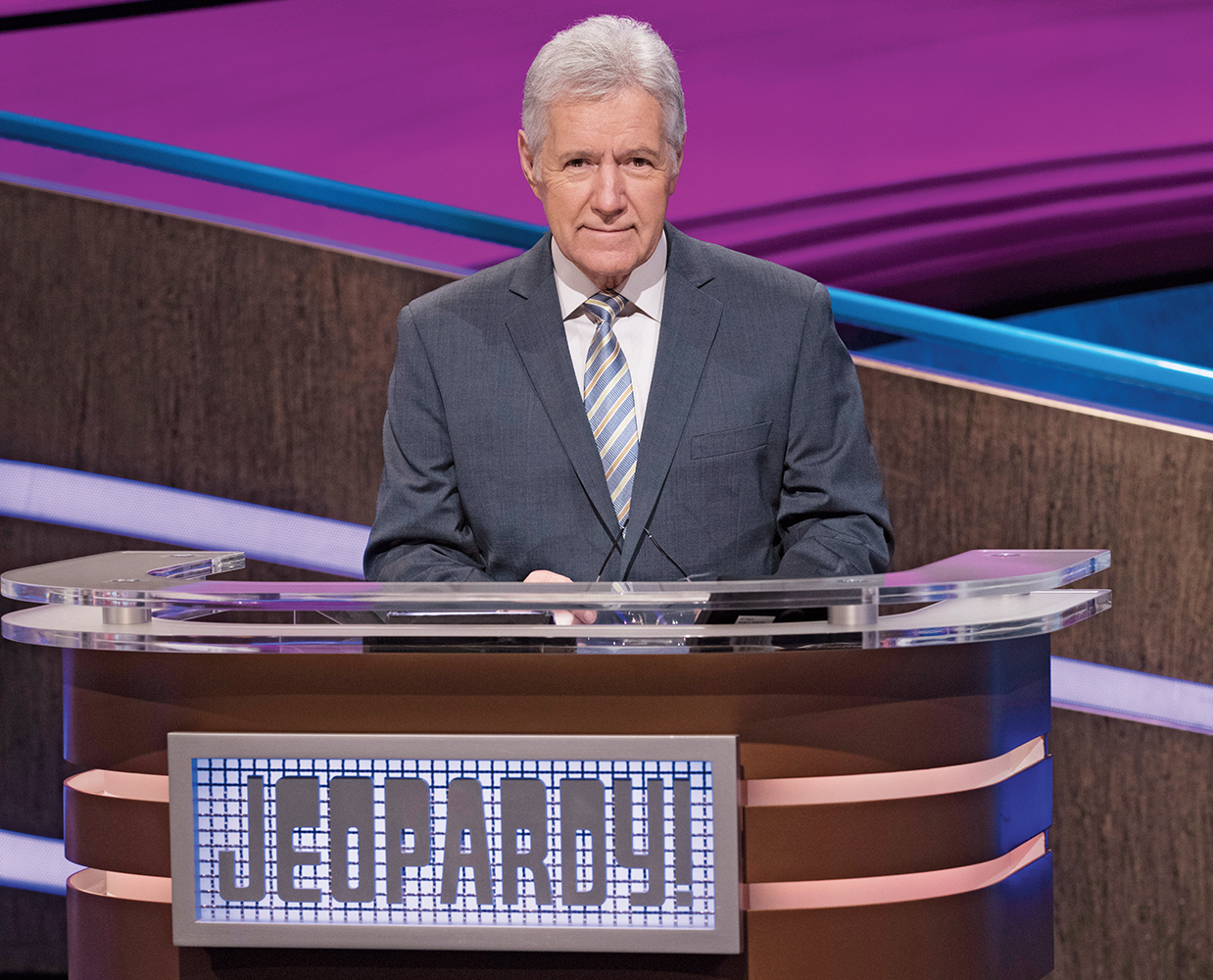The TV icon who passed away on Nov. 8 was born to host Jeopardy! This profile appeared in the June 2020 issue of Good Times
By Peter Feniak
Instead of writing an answer to the “Final Jeopardy!” question for November 12, 2019, Jeopardy! contestant Dhruv Gaur wrote a message that spoke for millions—a tribute to the host of the classic quiz show.
In his usual crisp, engaging manner, Alex Trebek read out Gaur’s words: “What is: We [Love] You, Alex!” Then, realizing the message was meant for him, he briefly lost his legendary cool. “That’s very kind…thank you,” he said softly, his voice breaking. And then the game went on.
Jeopardy! has been going on for more than three decades, still the same engaging, educating TV contest it’s always been. The daily syndicated show has broadcast more than 8,000 episodes and won 33 Emmy awards. The prestigious Peabody Awards for 2011 celebrated the show “for encouraging, celebrating, and rewarding knowledge.” The show is a nightly treat for fans everywhere, and Trebek has become an iconic figure.
But since early last year, the host of the show since 1984 has been fighting cancer and tough odds.
“Take your work seriously,” he said once, “but don’t take yourself too seriously.” What’s become clear over the past 15 months is how much people everywhere seriously care about this gifted broadcaster. In March 2019, Trebek spoke directly to his television audience:
“Hi, everyone. I have some news to share with you…. Just like 50,000 other people in the United States each year, this week I was diagnosed with Stage 4 pancreatic cancer. Now, normally the prognosis for this is not very encouraging, but I’m going to fight this and I’m going to keep working—and with the love and support of my family and friends, and with the help of your prayers, also, I plan to beat the low survival rate statistics for this disease.” Then he suddenly looked mischievous and went on:
“Truth told, I have to—because under the terms of my contract, I have to host Jeopardy! for three more years. So help me. Keep the faith and we’ll win. We’ll get it done. Thank you.”
The facts are daunting. Pancreatic cancer is among the most dangerous forms of the disease; Stage 4 indicates the condition is advanced and spreading. Early detection makes a great difference, but the warning signs (diabetes, weight loss, jaundice, pain in the upper abdomen) are often missed. Trebek missed them. He began chemotherapy—the powerful drug treatment that can kill cancer cells but can also bring severe pain and demoralizing side effects. When Jeopardy! taping resumed, Trebek was back hosting—and dealing behind the scenes with hair loss and sudden excruciating stomach cramps.
“I can always suck it up when I tape the show,” he reported. “I can be in my dressing room…not able to move. Then, all of a sudden, when [announcer] Johnny [Gilbert] says, ‘Here’s our host, Alex Trebek!’ [it’s:] ‘Okay, let’s go.’” As he has from his earliest days on-air, he continues to hit his mark. And many of us find ourselves wondering: How much do we really know about Alex Trebek?
An Unruly Student
He was born in Sudbury, ON, on July 22, 1940. His father, George Trebek, an immigrant from Ukraine, was a chef at one of the mining city’s best hotels, the now-gone Nickel Range Hotel. (King George VI and then-Queen Elizabeth, the Queen Mother, overnighted there in 1939.) His mother, Lucille Lagacé, was from Sudbury’s large Franco-Ontarian community. Alex, one of two children (his younger sister, Barbara, died of cancer in 2007), grew up bilingual. He played outdoor hockey in the winter and swam at Ramsey Lake in the summer. At 13, he took his first job as a bellhop at the Nickel Range Hotel. And then, as he told Ottawa broadcaster Ken Rockburn in 2013, the boyhood days ended:
“I did Grade 9 at Sudbury High and then my parents separated—later divorced—and that really threw me for a loop. My best friend’s father, [who] owned the hotel my father worked at, had sent his son to the University of Ottawa prep school. I said, ‘Okay, let’s go there.’ Though they almost threw me out after the first year, [those were] probably the best years of my life.”
He had been, he says, an unruly student, but after a rough beginning, some caring educators connected with the teenager. He’s never forgotten them. “The Oblates of Mary Immaculate priests were teaching me,” he told CTV’s Lisa LaFlamme. “They straightened me out. I was rebelling, and they calmed me down. They taught me how to be a better person.”
Admitted to the University of Ottawa, he shone in debating and public speaking. But money was a serious problem. Decades later, Trebek explained to US shock jock Howard Stern, “I got into broadcasting because I needed a job for tuition. Tuition was a whopping $500 a year!”
Quick-witted, articulate, and gifted with a strong voice, he auditioned successfully to be a relief announcer for CBC Radio Ottawa, a fill-in for times when vacations and legal holidays took the main announcers away. Eventually, two permanent positions opened up and, at 21, Trebek went full-time. (The other position went to future anchorman Lloyd Robertson.) With a year left to finish his B.A., he focused on philosophy, which, he told Rockburn, “had its classes only in the morning; I worked at the CBC from four to midnight.”
In 1963, Trebek moved to Toronto, where he proved to be an announcer/host who could do just about anything. He read the news on CBC. He hosted Reach for the Top, a knowledge-based TV quiz show featuring top students from rival high schools. He helmed Toronto’s instalment of the cross-Canada daily teen show Music Hop. Sports events, talk shows, game shows, specials: he did them all, including, as a bilingual presenter, hosting Ottawa’s Centennial celebrations on July 1, 1967, welcoming Queen Elizabeth and Prince Philip. He was talented, versatile, and, eventually, restless.
“I remember one day,” Lloyd Robertson recalls in CBC-TV’s Life and Times special on Trebek, “[Alex and I] were talking about whether or not you could become a millionaire by being a broadcaster in Canada. I think both of us reached the conclusion that it was going to take a very long time.”
Then Trebek got a phone call from Alan Thicke.
Thicke, a brash multitalent originally from Kirkland Lake, ON, was then a Hollywood writer at his wit’s end—he needed the right host for a game show he was pitching, The Wizard of Odds, and he knew Trebek’s skills. Trebek auditioned and was picked to host the pilot for the project. The handsome, poised presenter—now sporting his trademark moustache—helped the new show get network (NBC) approval. In 1973, Trebek began his life in American television.
The Wizards of Odds proved forgettable; Trebek did not. NBC dropped Thicke’s show, but moved the host to another game show, High Rollers. Over the next decade, his career chart began to fill with TV quiz contests: Double Dare, Pitfall, Battlestars—some lightweight, some challenging. Occasionally, he flew back to Canada for hosting stints on Stars on Ice and The $128,000 Question. He even refreshed his bilingual skills hosting a special program pitting Reach for the Top students against francophone scholars from the show Génies en herbe (“Budding Geniuses”).
Over a decade, Trebek became a familiar name in American television. In 1974, he married businesswoman/broadcaster Elaine Callei and formally adopted her daughter, Nicky, now part of the Jeopardy! team. The couple divorced in 1981.
Answers and Questions
In 1984, the powerful entertainment figure Merv Griffin decided to revive the brainy TV quiz game he had created, called Jeopardy! (it originally ran from 1964 to 1975). With this, Trebek found the show he was made for.
The show had offered a clever reaction to the famous quiz-show scandals of the 1950s, in which some contestants were fed the answers. Griffin’s then-wife, Julann, suggested “giving them the answers to begin with,” instead of questions.
And that’s the way it works: given a general knowledge “answer”—in a category that could be anything from “Alice in Wonderland” to “The Zither”—three contestants are challenged to respond with the question that completes the thought. For example, in “European History,” the answer “Visited by 15 million people a year, this spot in Britain honours an 1805 battle fought elsewhere,” pairs with the question “What is Trafalgar Square?” As the home audience plays along, contestants—chosen for their strong knowledge base—amass dollar scores that they wager on the “Final Jeopardy!” challenge at the end of the show. Some players have become famous, most notably Ken Jennings, who won more than $2.5 million in 2004 with a record 74 straight games and who later faced an IBM computer called Watson (the computer won).
Over his first decade on American TV, Trebek had displayed mental quickness, wit, and poise. He was Griffin’s first choice for host and proved a perfect fit, running the complicated game in calm, crisp fashion while enjoying the challenging competition. “I like shows where the contestants make money the old-fashioned way—earning it,” he would say later. “They have to be bright, they have to know something; it’s not just a question of luck.” He was fully engaged with the game. Trebek and Jeopardy! found their audience and never looked back.
Trebek became a TV icon. Gifted comics Will Ferrell and Eugene Levy lampooned him, portraying the brainy quiz-show host pushed to the edge by idiot guests. The master quizmaster himself was often invited for cameo appearances on TV shows as varied as Cheers and The X-Files. When he impulsively shaved off his trademark moustache in 2001, shocked fans caused an uproar.
The massive syndication revenues for Sony television (which bought Jeopardy! from Griffin) eventually made the Sudbury native a rich man—his current salary is an estimated $10 million annually. Trebek remembered that his parents “didn’t have much, but were very generous in giving of themselves to help people.” He followed that example, donating millions to two beloved institutions, the University of Ottawa and the Royal Canadian Geographical Society. He supported the humanitarian-aid charity World Vision International, broadcasting from crisis zones, and the children’s charity Smile Train. A dual Canadian-US citizen since 1998, he made frequent visits to American troops abroad for the USO (United Service Organizations).
His own foundation made significant, targeted donations to troubled areas. Awards for his giving accumulated, along with Emmys and other performance prizes. And when he was nearing 50, Trebek once again became a family man.
Trebek’s second marriage, beginning in 1990, to real estate manager Jean Currivan, has been a happy one. Their two children are now on their own paths. Emily Trebek works in real estate in Los Angeles, Matt Trebek runs two popular restaurants in Manhattan’s Harlem and Hamilton Heights districts, Oso and Lucille’s. (Trebek’s mother, Lucille, lived with the family in California until her death.)
Home matters a lot to Trebek. Beyond family, a main reason for this passion is his expertise in home repair. He says it keeps him fit and that he first learned skills in Sudbury, where “all of my mother’s brothers were involved in the construction industry.” He can do the tough jobs—electrical, plumbing, roofing—and has the scars to prove it. He fell from a roof while repairing it and had one foot crushed by a jackhammer while fixing a patio. He’s also endured a ruptured disk, kidney stones, a torn Achilles tendon from chasing a burglar, and two heart attacks. “I’m a tough guy,” he joked to CBC’s Rosemary Barton. “I’m Canadian. I play hockey.”
But despite what we think we know, what we’ve learned about Trebek over the years has been sparse. He’s rarely in the gossip columns or connected with the Hollywood lifestyle. (He arrives at the studio lot in a pickup truck.) And he’s chosen homes—including a 700-acre horse ranch—far from the show-business capital. “He is widely known to be a private man,” according to the online database IMDB.
Prickly? Shy? Reserved? Maybe all three. I watched him from a few seats away as we both waited for a flight to Toronto from Chicago some years ago. People approached him and told him how much they enjoyed him. He thanked them, but he never lost his reserved demeanour, nor did he do so on the flight, though he was fussed over by flight attendants. And then he was off. Where to? To Sudbury to see family? (He does that.) To Ottawa for an award? (He is an Officer of the Order of Canada and the current Honorary President of the Royal Canadian Geographical Society.)
“I wonder what goes on in your mind?” an interviewer once asked. “Keep wondering,” Trebek smiled. Nevertheless, he gave curious fans a peek in his autobiography, The Answer Is… Reflections on My Life (Simon & Schuster), which was published on July 21, 2020, the day before his 80th birthday.
One Day at a Time
His fans may not know Trebek well, but he is nevertheless a television personality who is loved—by family, production staff, studio audiences, and viewers. There are many reasons to appreciate Trebek, from his philanthropy to his sly sense of humour.
“What draws me to him is the respect he evidently has for the contestants,” long-time Jeopardy! watcher Murray Lewis (the editor of Good Times) said when I asked him. “He often says how much he enjoys being in the company of ‘such bright people.’ It’s clear that he means it.”
Much is made of Trebek’s evident high intelligence. CNN broadcaster Chris Cuomo has commented, “Since 1984, he has been the smartest guy in our living rooms…teaching us, bringing us together.” Lewis sees it this way: “I think his greatest asset is that he seems a genuinely kind man.”
Trebek and his medical team were optimistic after his first run of chemotherapy. His tumours were vastly reduced. Then, he said, “I lost 12 pounds in a week and my numbers went sky-high.” Still fulfilling his Jeopardy! obligations, he has resumed chemotherapy.
“Moments of great pain,” he told viewers in an update, “made me wonder if it really was worth fighting. I brushed that aside quickly—that would have been a massive betrayal of my soulmate, Jean, who has given her all, of other cancer patients who have looked to me as an inspiration and a cheerleader of sorts, of the value of living and hope. And it would certainly have been a betrayal of my faith in God and the millions of prayers that have been said on my behalf.”
He seems irreplaceable, but there will be a time, he says, when his performance slips and he’ll leave the program he helped to relaunch in 1984. Cards, letters, prayers, and good wishes flooded in to him after his first announcement in March 2019. His response: “It touches me at a very deep level. I’m a lucky guy.”
Photo: Courtesy of St. Martin’s Press.





